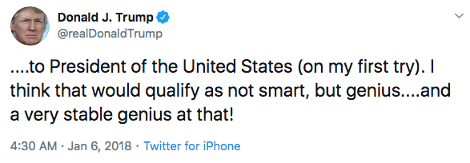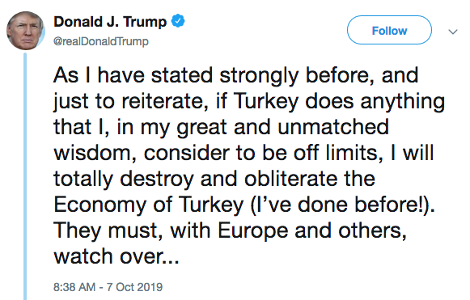

⬅ Donald Trump: Mental Health Assessment
The current assessments (January 2021) from Dr. Trump and Dr. Zebra are below. Update 2023 -- Trump's post-presidency legal embroilments solidify the diagnostic discussion that follows.
The already-voluminous writings on Trump's mental health by healthcare professionals are certain to grow. Only a sampling of them is reviewed here.
Some observers have posited organic disease (i.e. damaged brain tissue) as a driver of Trump's mental state, including:
- Neurosyphilis 1: Aside
from any analysis of signs and symptoms, the disease can be confidently ruled out for
other reasons.
- As of early 2017 Trump had been on a tetracycline long-term ("refilled prescriptions" 2) for rosacea. This would eradicate any latent syphilis, given that just 14 days of a tetracycline is a standard syphilis treatment in persons allergic to penicillin 3.
- At the time of Trump's first marriage New York state still required pre-marital syphilis tests 4. This does not rule out a later infection, but it does clear his teens and twenties.
- As a germaphobe, Trump would be expected to seek treatment immediately for any of the symptoms of primary or secondary syphilis (the precursor states to neurosyphilis, which is a form of tertiary syphilis).
- Dementia (1): In January 2018 seventy-five health professionals
and para-professionals (including 8 physicians) signed a letter to Trump's
physician, Dr. Ronny Jackson,
stating their concern that the president had dementia
5.
They urged Jackson to administer the "Montreal Cognitive Assessment" test to Trump.
The White House had earlier declared that a cognitive assessment would not be part of Trump's upcoming medical examination that month 6, but Jackson apparently heeded the letter (kudos to him) and administered precisely the test urged.
Trump got a perfect score 7, after which the leaders behind the original letter declared that was insufficient to rule out pre-dementia 8. (Which raises the question: Why did they urge so inadequate a tool as the Montreal test?) Jackson afterwards answered extensive press queries about the test and about Trump's mental abilities 9. - Dementia (2): The clear change in Trump's speaking
pattern over the last 30+ years
10 -- simpler words, simpler sentences --
has also been taken as a sign of brain degeneration. However,
it is not possible to ascribe the change to brain disease without first ruling out
the more likely reason that the simpler words and cadences are politically
effective 11. Indeed, linguistic analysis of 21,739 of
his tweets over 10 years supports this, showing that, in that medium, Trump has 4 language
styles that shift systematically depending on his communication goals
12 13.
Trump's language is also remarkable for its slipperiness. Sentences, or more often, sentence fragments, are hedged, qualified, blurred, and, especially, ascribed to nameless third parties. His interview with Dr. Oz is an excellent example 15, and he was able to deliver it off the cuff. This speech pattern, so fluid as it emanates from Trump, can seem like twisted genius because the rest of us would have had to labor hard to draft answers sounding as natural, helpful, and easily digested as his, but so lacking in certainties. In reality, it is more likely that Trump's years of business dealings have made him well-practiced in such haranguing speech. - Dementia (3): For Trump in 2019 Dr. Zebra does not entertain the diagnosis of dementia of the Alzheimer type, the hallmark of which is declining memory for recent events. Whatever one may say about Trump's mental state, it is quite clear from even his brief interactions with the press that his memory for events of the day is excellent. Continuing the outside scrutiny of Trump's mental faculties is completely valid 16, as is urging his physicians' attentiveness to it, but such scrutiny must consider both the denominator and the numerator, i.e. what the President does well, not just his flubs.
- Sleep pathology: Dr. Zebra discusses Trump's sleeplessness at length. Deficient quantity and quality of sleep would seem to be the leading suspect in causing signs that others have interpreted as dementia.
Dr. Zebra does, however, have two areas of concern about Trump's mentation.
A high-profile book, published in 2017, collected essays from three dozen psychiatrists who analyze Trump's psyche 17. Although a second edition followed two years later 18, the timing of the first book betrays a superficial approach to its subject. Less than three months after Trump's inauguration the book's editor "hosted a town hall meeting at Yale medical school" to debate going public with psychiatric concerns about Trump 19, and just six months after that that the book of essays was published. This is remarkably fast. Dr. Zebra knows something about the time required to research the medical history of presidents -- a single journal article can require years of digging for facts, even in the case of an unstudied president like William Taft, for whom facts are scarce. The rapid appearance of purportedly fact-based articles about a man who has a 40 year evidentiary trail that needs to be scoured immediately consigns them to the bin of superficialities that is unfortunately typical of presidential psychiatric assessment.
Moreover, after reading the introduction to both editions, Dr. Zebra has not been motivated to read further. It seemed that (a) new diagnostic entities were being invented just for this patient ("malignant normality"), and that (b) based on the hyperbolic "warnings" about Trump from the authors of the essays, their objectivity and detachment seemed irretrievably tainted. The latter point has been noted by others, too 20.
The second area is mania, in the psychiatric sense of the word. Trump has always been grandiose, but some tweets of his are harrowing:
- Shortly after a damning book on Trump and his presidency was published
and received immense press attention 21,
Trump tweeted
22
that he was elected...

- Pummeled by bipartisan criticism about concessions on Syria
that he made to the President of Turkey after a single phone call,
Trump tweeted, in absolute seriousness
25:
